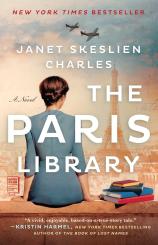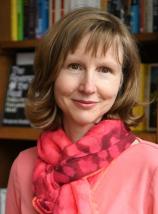Reading Group Guide
Discussion Questions
The Paris Library

1. Chapter 1 begins with Odile noting that “numbers floated round my head like stars” (3) as she runs through the Dewey Decimal system in her head. What does this opening say about her?
2. When Odile is first introduced as Mrs. Gustafson, Lily notes that she “donned her Sunday best --- a pleated skirt and high heels --- just to take out the trash. A red belt showed off her waist. Always.” (10) What does the red belt represent? And why, at the end of the novel, does she replace “her tatty red belt with a stylish black one”? (344)
3. Miss Reeder “was adamant that there was a place here for everyone” (3) at the Library. How do she and others like Boris and the Countess prove that throughout the Occupation?
4. Odile and Lily come from very different backgrounds, different countries and different eras. Where do they find common ground?
5. Among the Library’s subscribers and habitués are many fascinating and eccentric characters, such as Professor Cohen and Mr. Pryce-Jones. Who is your favorite, and why?
6. Consider Odile’s Aunt Caroline, and how Caro’s experience informs Odile’s decisions regarding Paul and Buck. Do you believe Odile’s assertion that her mother would “cast me out, just like Aunt Caro”? (332)
7. Why do you think Janet Skeslien Charles decided to interweave Lily’s story, set in Montana in the 1980s, with Odile’s story in Paris during World War II? What do the dual narratives reveal, and how do they reflect on each other?
8. How is Lily’s adolescence in Montana similar to Odile’s own coming of age in Paris? How do books and learning the French language serve as a refuge for Lily?
9. Odile refers to Bitsi as her “bookmate” (50) and later reflects on their experiences by noting that “coming face-to-face with Bitsi is like looking in the mirror” (166). How does their friendship develop over the course of the novel?
10. When Professor Cohen finishes her manuscript, she knows she cannot publish it, and she entrusts it to Odile, saying, “Books and ideas are like blood; they need to circulate, and they keep us alive. Without you, I couldn’t have continued this long. You’ve reminded me that there’s good in the world” (240). What does this speech mean to you? Does this serve as greater motivation for Odile to continue her work?
11. Odile discovers the “crow letters,” letters and “denunciations...from black-hearted people who spy on neighbors, colleagues, and friends. Even family members” (283) in her father’s office. Lily, too, finds the letters at Odile’s house. What do these letters, signed by “one who knows,” show? Why do you think the author includes them?
12. Toward the end of the novel, after the Liberation, we see the insidious cycle of violence as Paul and his colleagues attack Margaret, stating, “She wasn’t a woman to them, not anymore. They’d been beaten and humiliated. Now it was their turn to beat, to strike, to slash” (312). How does this event change the course of the novel? How do these men perpetuate the cycle of violence? Would you have reacted as Odile does, or what would you have done differently?
13. At the end of the novel, Odile says that “it seemed that life had offered me an epilogue” (342). How does Lily and Odile’s intergenerational friendship provide them both with a safe place to grow?
The Paris Library
- Publication Date: March 1, 2022
- Genres: Fiction, Historical Fiction, Women's Fiction
- Paperback: 384 pages
- Publisher: Atria Books
- ISBN-10: 1982134208
- ISBN-13: 9781982134204







